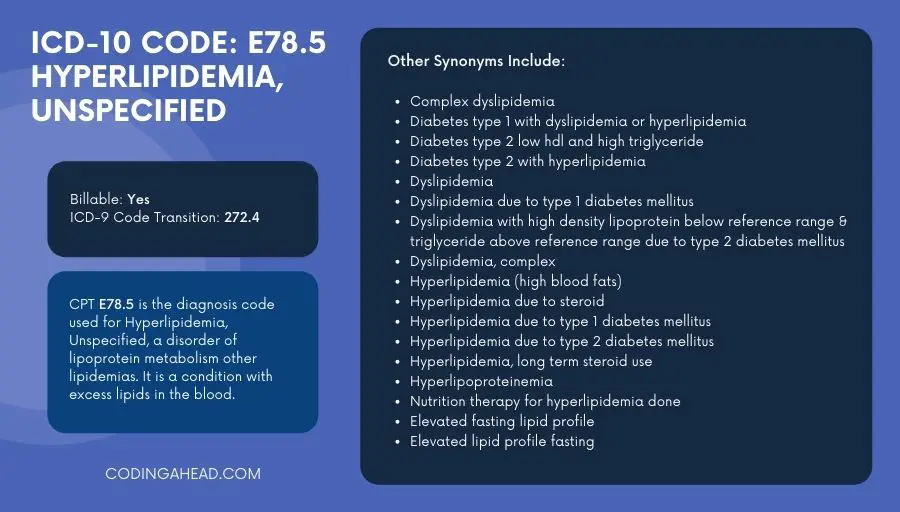(2022) How To Code Hyperlipidemia ICD 10 – List With Codes & Guidelines
Hyperlipidemia is the medical term for high cholesterol. Hyperlipidemia is usally caused by an unhealthy lifestyle. In this article we will outline the symptoms, causes, diagnosis, treatment and ICD 10 codes for hyperlipidemia.
What Is Hyperlipidemia ICD 10?
Hyperlipidemia is the medical term for high cholesterol. Hyperlipidemia is a common condition, occurring in 1 in 4 individuals.
Triglycerides are one of the body’s main ways to remove fat from the body, in order to lower blood cholesterol levels and improve blood flow to all tissues and organs. Individuals with hyperlipidemia are unable to remove fat properly from the blood or LDLs.
What Are The Causes Of Hyperlipidemia?
Many healthy people have high levels of total and free cholesterol in their blood. The doctors usually advise people to have a healthy diet and exercise.
Poor eating habits, bad lifestyle habits, and smoking are the major factors for a high blood cholesterol. The condition is often undiagnosed.
What Are The Symptoms Of Hyperlipidemia ICD 10?
There are a lot of symptoms of hyperlipidemia, but the two main ones are: Reduced or absent circulation in the fingers and toes.
An unhealthy lifestyle can damage the walls of the arteries, and as a result cause the arteries to narrow, making it harder for the blood to flow through. This causes the blood to be backed up into the arteries, which means that the level of cholesterol in the blood is higher.
How Is Hyperlipidemia ICD 10 Diagnosed?
As previously stated, hyperlipidemia is usually caused by an unhealthy lifestyle. Other causes of hyperlipidemia are diet, smoking, heart disease, family history and type 2 diabetes.
To accurately diagnose hyperlipidemia, the doctor will take the patient’s blood and assess its pH levels, cholesterol levels, triglycerides, total cholesterol, HDL and LDL cholesterol levels. The doctor then uses a blood test called a lipoprotein profile.
The lipoprotein profile will show the level of these lipids, along with other biomarkers, and give an accurate diagnosis. However, if a doctor suspects that the patient has hyperlipidemia they will order a more detailed lipid profile.
Treatment For Hyperlipidemia ICD 10
The treatment of hyperlipidemia is mainly dietary in nature. Commonly recommended dietary factors that can help reduce cholesterol levels include fruits and vegetables, nuts, seeds and legumes, and low-fat dairy products.
Medicines such may also be prescribed to people who are unable to reduce cholesterol levels through diet alone.
ICD 10 Codes For Hyperlipidemia
Hyperlipidemia can be classified as either primary or secondary. Primary hyperlipidemia is caused by uncontrolled cholesterol levels.
Secondary hyperlipidemia (also called familial hyperlipidemia) is caused by genetic abnormalities. Primary hyperlipidemia is the most common form of hyperlipidemia.

The ICD 10 Codes for hyperlipidemia can be found in chapter 4 of the ICD 10 manual.
ICD 10 Code E78.00: Pure hypercholesterolemia, unspecified.
ICD 10 Code E78.01: Familial hypercholesterolemia.
ICD 10 Code E78.1: Pure Hypertriglyceridemia.
ICD 10 Code E78.2: Mixed hyperlipidemia.
ICD 10 Code E78.41: Elevated Lipoprotein(a).
ICD 10 Code E78.49: Other hyperlipidemia.
ICD 10 Code E78.5: Hyperlipidemia, unspecified.
ICD 10 Code E78.6: High-density lipoprotein deficiency.
ICD 10 Code E78.70: Disorder of bile acid and cholesterol metabolism, unspecified.
ICD 10 Code E78.71: Barth syndrome.
ICD 10 Code E78.72: Smith-Lemli-Opitz syndrome.
ICD 10 Code E78.79: Other disorders of bile acid and cholesterol metabolism.
ICD 10 Code E78.81: Lipoid dermatoarthritis.
ICD 10 Code E78.89: Other lipoprotein metabolism disorders.
ICD 10 Code E78.9: Disorder of lipoprotein metabolism, unspecified.


